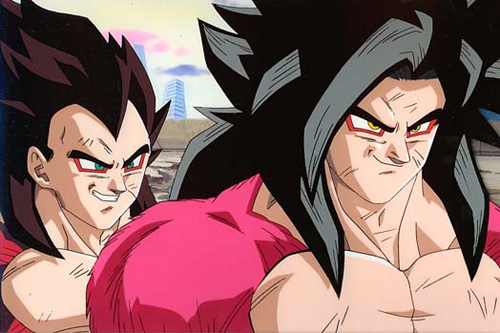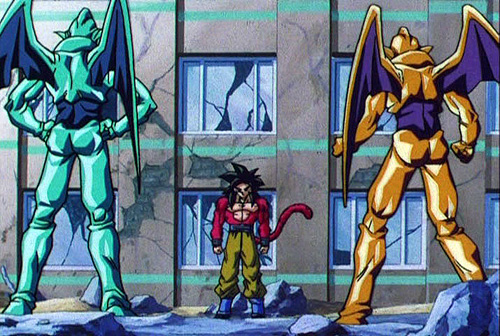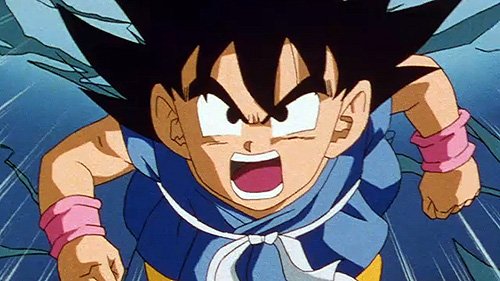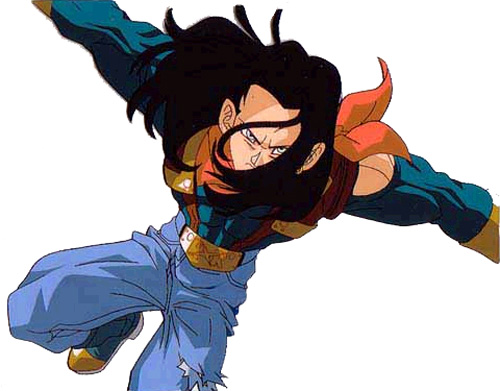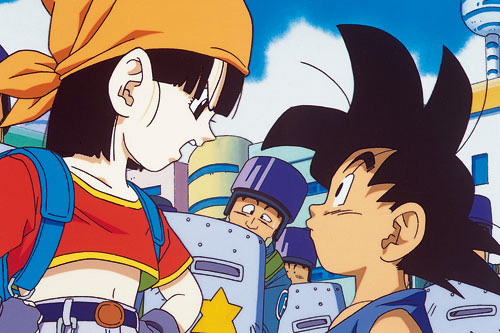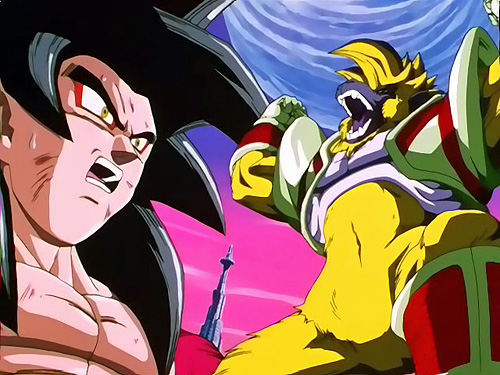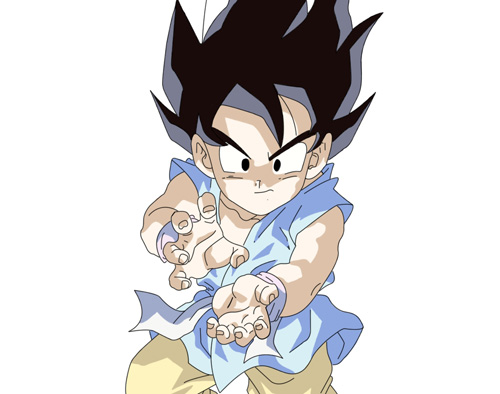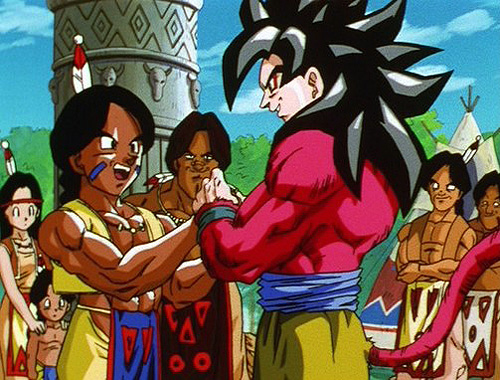Dragon Ball GT Music – Composer Mark Menza Interview Part 2
Welcome back to Part 2 of my interview with Mark Menza, composer of FUNimation’s Dragon Ball GT. We are continuing from Part 1.
In this interview you will learn about Mark’s perspective on Bruce Faulconer, hear his thoughts on the Dragon Ball fandom, and discover the origins of the Dragon Ball GT rap intro!
That’s right, the full explanation for the GT rap intro!
You’ve been waiting 9 years to hear the answer to this great mystery surrounding the Dragon Ball GT dub, so don’t miss it!
Bruce Faulconer and Mark Menza
Okay Mark, let’s get right into some of the controversy.
This may be a little sensitive, and I fully respect your right to stay silent or private on any of these questions, but these are things fans want to know. I polled the Dragon Ball community asking, “What would you like to know from Mark Menza?”
Mark: Right.
Derek: I’m going to talk about Bruce Faulconer, alright?
Mark: Okay.
Derek: Bruce Faulconer and his staff had developed a large following of fans for their Dragon Ball Z music. FUNimation evidently decided to not hire them again to continue with GT. Do you know why that is?
Mark: You know, I really don’t.
Again, I got to know Barry Watson [a FUNimation producer] on a personal level because I knew his wife. When he heard some of the music I did I think they were just looking for another voice on GT. Nowhere could I tell that they didn’t want to use Bruce or had a problem with him.
I don’t know a thing about it, let me put it that way.
Derek: You had done the Dragon Ball Z movies and then signed on for GT. I read that Bruce was very upset about this and actually pleaded fans to petition FUNimation to hire him back.
Mark: Right. I had heard that from somebody at FUNimation.
Derek: So you can confirm that that happened?
Mark: I heard it, I can’t confirm that it happened. Well, I mean like anybody he probably wanted to get hired back, like “Hey man, I’ve done a lot of work for you guys, why don’t you hire me again?” Why they did or didn’t, that’s a question for somebody else because I was not a part of hiring.
I don’t know how many episodes he did, but I’m sure it was WAY more than I ever did.
Derek: He did 224. There are 291 in DBZ and he started at episode 68.
Mark: Wow, yeah, and I did 64. So he definitely had a bigger deal there, but even other shows, we talked about The Simpsons a moment ago, they started with one composer and then they transitioned to Alf Clausen, like maybe in the 3rd season.
You never know, sometimes it’s just a particular voice that maybe they were looking for on GT. I’m definitely more of a guitar player, so maybe, and I’m totally guessing, I wouldn’t at all want you to convey that Mark Menza got hired because he played guitar and this other guy is not a guitar player. I don’t know if that’s at all true.
Derek: Well, it is! Bruce hired assistants who played guitar for him, like Scott Morgan and Bud Guin. Bud played lead guitar for the main theme of Dragon Ball Z. He had others as well, students from local universities in Dallas.
Mark: Then maybe not, I don’t know. Then my guess is inaccurate. Haha! But I couldn’t really tell ya. That would be more of a question for Gen or somebody like that.
I think they just wanted somebody else.
Derek: That is a very clear answer. Thank you. Were there ever any conflicts between you and Bruce or his staff?
Mark: No, and you’re saying he had multiple guys over there, I didn’t know that. You mentioned Scott Morgan, but I don’t know that name.
Derek: Okay. A lot of fans felt confused about the switch from Bruce to yourself, because there was just silence from FUNimation, there’s mystery surrounding the why, as in, “Why not use Bruce?” Now you’ve cleared it up for us. I really appreciate that.
Mark: I don’t think there’s anything mysterious or nefarious there, I just think they maybe had exhausted all the possibilities, I don’t know, it’s hard to say. I’m sure he worked really hard on that show and did a great job for them and I think they were extremely happy.
Now did he do any movies as well?
Derek: Yes, he did the Lord Slug film before you came on board.
Mark: Okay, cool.
Derek: There is a very noticeable difference between the two musical styles, the compositional theory and the overall soundscape between Z and GT. Was this due entirely to the musical differences between you and Faulconer Productions? Or, as you touched on earlier, did FUNimation offer guidelines on how you were to approach the project.
Mark: Other than the things we’ve already talked about, they wanted to age it up. I don’t know how that compares to DBZ. Whatever dialogue the guys at FUNimation chose to use, or what provisions they used, whether it was Barry or other guys that worked directly with the crew at Faulconer.
I did meet with one composer, one guy who came to interview with me years ago. Mike Smith. He came to look for a gig as a composer and he had worked as a staff / assistant for Faulconer Productions.
He was a nice guy, seemed kind of young at the time. Other than that one experience I don’t think he had done a lot before that. He was a super nice guy, very talented, but he was a little green, particularly in the scoring to picture arena, which I think is a different skill set than being a song writer or somebody who writes symphonic music. Very different from my skill set where I tend to always be. Thank god I get a lot of work, so 99% of what I write is for something to picture.
I don’t think Mike had a lot of experience dealing with that.
Derek: I know Mike! I know all about him and have read about him.
Mark: He was a nice guy, very talented, and I would never want to say anything disparaging about him, but he definitely seemed like he was, probably when he came to working on that show, I can only guess, and this is just my idle speculation, that was one of the first time’s he had a chance to write that much to picture. It was probably a wonderful experience for him.
Derek: Yep, he was a student at Southern Methodist University and he got picked by Bruce to go work for him as an intern sort of thing. Bruce taught classes there. Mike had worked with Bruce for a year prior to Dragon Ball Z, and was there on day one for DBZ episode 68.
Mark: Well there you go! That confirms my suspicion! And that was apparent, let me put it that way. He was a super nice guy, but I was not in a position to hire an assistant. If I was, I certainly would have considered him. Super nice guy.
Corporate Direction
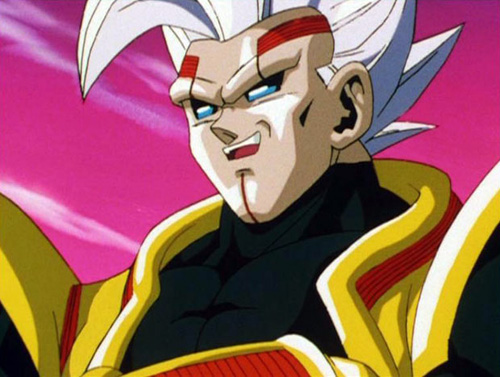
Derek: How much of GT’s music was your own creative decisions rather than corporate direction?
Mark: Well, boy, you know, I would say that most of it at the end of the day would have been things I came up with, but it was based on them giving me initial directions.
If somebody came to you and said, “I want you to play the part of an obnoxious villain in a movie for us,” and you played a really great bad guy who everybody loved, people would say, “How much of this is real, are you really this bad of a guy?” Well, no, that’s a part you’re playing.
I would have to say at the end of the day it’s a 50/50 proposition. Anything they didn’t want or wouldn’t fit, they would immediately tell me. If I ever by accident or potentially had some Jazz influence that showed up and they didn’t like it, believe me they would tell me to change it.
Derek: I see. I heard from Ric Villa, one of the FUNimation producers at the time, that GT had failed in almost every country where it appeared, except for in America. He said that was due to the edits FUNimation made, and the overall tonal change of the series from a light and happy adventure, to a heavy, dangerous, violent battle. And it’s true that it then became a financial success. What are your thoughts on these changes?
Mark: I guess I don’t have any opinion on it because I didn’t know the original GT in Japan. The little bit I had heard, I’m talking less than an hour of my life invested in listening to some of the original music, to say that oh yeah, it’s sweeter, definitely younger. Beyond that it was simply like, “Okay, don’t go there.”
Once I got the show, the shows sort of wrote themselves, guys yelling at each other, the voices are very aggressive, well, [that means] this music has to be aggressive. The show is aggressive, it’s about life and death situations, and it became… everything that Ric said is accurate. It was that.
Now saying that it BECAME that in comparison to something else, that I don’t know because I only know the more aggressive version of GT.
That’s what directs me a lot. Like when I was going off earlier about playing to picture, that’s totally what I respond to.
Derek: Right, that makes perfect sense. I completely understand.
Origins of the GT Rap Intro!
Derek: FUNimation acquired Dragon Ball GT in 2003 and they advertised it a lot and placed your intro theme song on their official website to build up buzz.
Mark: Oh yeah! Hahahahaha!
Derek: You remember that?
Mark: Oh yeah! Theme song! Haha!
Derek: So that song, now affectionately known as “Step into the Grand Tour,” premiered there, and it caused a really big reaction in the fan community. Some liked it, while others, to put it politely, did not.
Mark: They HATED it, man.
Derek: How involved were you with the development of this intro, and what do you think about it?
Mark: They, again, the idea was, and that was very much a directed idea, that was the first thing that I did on the show, before I saw any of the episodes obviously because they were still writing and figuring out sagas. They said, “Yeah, we want this thing.” They really had this idea of this rap tune.
So I did demo’s, 30 second ideas, “What about this, what about this, what about this kind of groove?”
I remember that they said, “Listen to this rap artist, and that rap artist.” I went and bought more rap CD’s than I had ever imagined I would own.
And this is what I love about my job, that I get exposed to more things all the time. Not because I’m always out there. There are some people I admire, they go out there and dig up new musical ideas all the time and are listening to new things. I kind of don’t have to do that because I have this whole bevy of clients that does it for me. They come to me one after another.
You have to understand that in the same week I’m doing a would-be rap piece for the intro to an anime, somebody else is having me write something for Boy Scouts of America and it’s on ukulele. Then I’m doing a very classical string quartet piece for some bank commercial. All at the same time. That’s the world that professional composers live in. I’m sure Bruce Faulconer is no exception, and all the guys who have ever come across the anime stuff.
I’m doing some heartfelt documentary at the same time that I’m doing GT. So we have what you would probably say is the most emotional, plaintiff and delicate, sweet little thing you ever heard, at the same time I’m playing this, “Bum Bum Bum Bum [bass guitar sound].” So that’s the nature of our business as composers.
And the GT thing was no exception. That theme song was just, like, try something different. Every day get up and try something different. And they really wanted that.
Derek: Haha, okay.
Mark: They’re going to come to you and say, “We’re thinking about this,” and lay 5, 6, 7 CD’s in front of me, and go, “Listen to these artists and then we’ll get back to you on the lyrics.” So they really wrote the lyrics.
Derek: Oh, THEY wrote the lyrics?
Mark: Yeah, yeah, yeah. Barry Watson. Now I did some tweakage on it, but they came up with most of it. Like, together we would sit down and go, “What about dada dada dee, dada da, dada da? Okay.” And that’s like one stanza. Then they went away and came up with 4 more stanzas.
Derek: Wow.
Mark: Yeah.
And then the real challenge was finding a rap artist who could perform the part. I had to go on my private talent search for a day or 2.
Derek: I was going to ask you, who was the vocalist that you hired?
Mark: Oh, god, what was his name? He was a really nice guy. A super nice guy. He was really trying to be a break out rap artist.
You have to set a budget and decide how much you can put into each part of the show. With script writers, the actors, recording, production and your own overhead, there’s only so much left to do something like a theme song.
Derek: Right. So he was a local talent?
Mark: He was a local talent, a guy I came across. I put my feelers out like I do whenever I’m looking for something.
He had a nickname he went by. It was like Shorty… something, or, god, I’d have to look it up. And I thought he was credited somewhere on the FUNimation website years ago.
Derek: I’ll look there, I’ll check.
[Note that I later looked through several years of Archive.org caches of the FUNimation site, but could not find any mention of this.]
[Luckily, through continued correspondence with Mark, I found out the rapper’s name. It’s Shorty the Man. Then through some further research I discovered that while in Dallas he published an album in 1999 called “Never 2 Far.”]
The Backlash
Derek: You said they HATED the intro. What was your reaction to the fans?
Mark: I never really took it seriously. It goes back to what we talked about earlier, like, man if I heard The Simpsons done in German with a new score I would probably think it was blasphemy.
I don’t know that I ever heard the original one. I’m sure I did, but I don’t have a solid recollection of it because it was back in 2003.
Then they wanted guys to sing on it. It was supposed to be a rap thing but it was also supposed to be a rock thing where they sing these high notes.
Derek: So you were really trusting their direction.
Mark: Quite frankly, it’s their money, their show. “What do you want me to do? Jump through the hoop?” And I would jump through the hoop. And I didn’t have any objection to it.
I didn’t initially think it was going to be like, super catchy. I have a hard time making really catchy tunes, but that’s not what they wanted, they weren’t looking for a catchy theme song, they wanted something that was edgier and different and didn’t sound quite as predictable. I don’t even know what that was in response to. I always assumed it was in response to what the original GT series had on it.
Or it may have been in response to what they did in DBZ and they wanted something with its own foot print. That happens all the time. People do remakes. U2 did a remake of the Mission Impossible theme and some people hated it and some people thought it was the coolest thing they ever heard.
Appealing to Demographics
Derek: Do you think there was any purposeful attempt to appeal to African Americans with the Dragon Ball GT soundtrack, with the rap and the hard, dark, heavy music. I’m not trying to be racist here, there just seems to be a very large fan base of African Americans for GT, whereas with the other series and demographics…
Mark: That was never pitched to me. You have to know that white suburban kids listen to as much if not more rap than the African American community. That much I do know as part of a demographic study.
I think Barry, Gen, and all the guys over there put their ear to the ground to see both what other shows were doing for the same demographic and also what was on the radio. And could they grab a bigger market share? It’s all about the market share.
If you’ve got more eyeballs on your show than other shows in the network, guess what, your show is going to get better time slots and higher revenue dollars. That way you can have more money from the networks for your show.
Derek: Right.
Mark: It’s very calculated on the part of the producers. Movies are made this way, everything in media is made this way. They try to figure out how to do the best job they can. Like, “How do we get the biggest audience?”
If you were making a show and putting millions of dollars into it, you would think, “Oh, I don’t want to lose my ass.” So let’s do this in a way that, forget your own personal tastes and what you’ll listen to in your car on the way home, who do you think the audience is? Say, males from 10 to 15.
If you think that’s your demographic, then you better go and listen to radio stations if you’re about to have a conversation with the composer you hired, go listen to radio stations and see what they’re listening to. Go watch other TV shows that are top rated for that time slot and listen to what the music is on them.
Derek: So they were trying to appeal to that demographic?
Mark: Totally, and I don’t think it was a specific African American demographic, because if it was only geared at that in some way, then it would really alienate another group, maybe a broader market. I think they were trying to hit as broad a market as possible.
I know the idea was not to put any sort of rap or hip hop influence into the show itself, but for the theme song, that was the idea at the time. And maybe they originally thought, “Well, we’ll do that, and maybe if we like it, then maybe we will have that in the show,” as part of like, Goku’s theme or something. But that never came up. So maybe they started there, I couldn’t guess about that.
Derek: So it’s very possible that, now you didn’t say this, but Goku might have had a rap theme if the intro had caught on and been successful?
Mark: Maybe! That’s total speculation. But really, from the get go once we started doing the actual episodes, it was, “We want it big, we want it driving, we want it guitar driven, and at the same time we like the symphonic thing,” that they had heard on my other projects. Those were the DBZ movies and work I had done for other clients.
That, probably more than anything else, including other composers who had worked for FUNimation, had more to do with them wanting me to do it like that. I think they liked the idea that I combined the guitar stuff with that kind of darker, orchestral scoring. So my best guess is that that is what led to considering me for the job.
Maybe they asked the guys at FUNimation what they were listening to and they said all kinds of things, or maybe they had all kinds of brainstorming sessions before they got to me and said, “Do this.”
Derek: Right. Very understandable.
Dragon Ball GT Music CD
Derek: There have been many CD’s of Dragon Ball Z music by Bruce Faulconer that have been published. Why has Dragon Ball GT music not been published and do you have plans to release it in the future?
Mark: I cannot release it. When you work for somebody, they own the publishing rights. Unless I own the rights, and maybe Bruce had a deal with them, well, he must have, to make his own CD’s. That’s pretty rare that you will unilaterally produce your own CD’s of music you did for a client, sell it, and not reimburse the client. Almost always the studio is involved. For example if you did a film for Warner Bros, the studio releases that album, not you.
Derek: Exactly. So why hasn’t FUNimation released a Dragon Ball GT CD?
Mark: The cost of doing that? Music sales have plummeted over the last 10 years, with illegal downloading going all the way back to Napster. The music industry and the idea of selling music for profit is in the toilet. I have a lot of family and friends in the music business and trying to make a living as a studio band only and selling music that way, rather than a touring act, is marginal at best.
But realize it was all continuous music, all 11 minutes long. I don’t know what it was like on Dragon Ball Z, was it continuous on that show as well?
Derek: Yeah, it was constant sound.
Mark: So they had to go back and turn those into separate queues, removing all the transitions, calling it “Fight Scene of Episode 12,” etc. You have to make up titles. That’s a bunch of work. I’d have to go back to those hard drives and I can’t even imagine wrapping my head around the idea of trying to edit that music into separate queues and turn out volumes of CD’s! I would have to hire an assistant to do only that! Hahaha.
Derek: How many tracks did you compose for the series, and did you have any favorites or was it all just continuous sound?
Mark: It was very continuous. I loved playing the guitar all day long because that was my first instrument, and I enjoyed doing that. But then the fact I would do that for 3 or 4 shows [would get tiring].
And then toward the end some of the closing music got a bit sadder when they wrapped things up in the last 2 or so episodes. Some of that I enjoyed. But maybe it was because it was different from the other 60 plus episodes we had done. Some very heartfelt themes when they split up.
I’d have to go back and listen to it all again to point to something specific.
And that was the goal.
Derek: Absolutely. I completely understand.
Dragon Ball Music Fandom
Derek: Next I want to ask you about the fandom. What are your thoughts on the Dragon Ball fandom that still burns so strongly? People tend to take sides, to put it very mildly. Did any of the more hardcore Japanese music fans who wanted it to sound like the original, ever give you a hard time?
Mark: No, although I will say that initially I would get some emails that were kind of tentative that were like, “Well, um, why did you, uh, why did you do that, because it’s really different from the other one?”
I would always have to confess that I didn’t know what the original was, and that I was just trying to make the show fun and exciting and geared towards a specific audience.
So I didn’t really have a response to it. And a lot of times, not to be rude, I can’t get engaged in these dialogues. Which is why I was even a bit tentative to do this interview.
I have to compliment you that your approach to me was very professional, and that had everything with me going, “Oh, okay, this guy is serious, he’s trying to write a book.”
Derek: Thank you.
Mark: Because a lot of the fans… I’ve had a few email exchanges. I had one brief email exchange with one guy, and I think only because I saw it show up on a Google Alert, posted it over and over again, analyzing 2 or 3 sentences. He was nice when he talked to me but he took quite a bit of liberty with it to interpret what we had talked about. And it was a brief conversation, 2 minutes, maybe 5 at the most.
I guess I just sort of find it mildly fascinating that the fans are so passionate about it. But at the same time I get being passionate about something you grew up watching, and I applaud their passion for a show. I can’t think I would ever find it off putting.
Derek: So you never got upset, angry or confused, “Why are people reacting this way?”
Mark:
I thought it worked at the time I did it. Any composer who tells you they listened to something they wrote 10 years ago, and it’s perfect, is lying to you. You only have so much time to work on it. At some point the client says, “Yeah, that sounds great, let’s do that. Make it that and turn it in tomorrow.”
But I could go back to GT for example and think, “Given some extra time I could rework that scene, maybe have done this differently.” Any actor will tell you that, any director, any writer, because you grow every year.
You’re a writer. If you look at some of the first things you wrote, or stuff from 2 years ago, you’d think, “Oh, you know, I try to use more mature language than that now.”
Derek: I agree completely. You’re always improving and growing.
Mark: Exactly! And you’re always changing. And I’m not just looking back and complaining. With some of the stuff I go, “Man, that was kind of a cool rift. I like that.” Then other times I listen to it and go, “Oh, that really goes on for a long time.” And I have to look back and realize that it’s because they were fighting for so long. So as much as possible you had to score the action and make it happen.
They forewarned me that fans are really passionate about the show.
Passion and Spirit
Mark: And the thing I thought was cool about the FUNimation guys is that, believe it or not, they were really into the show. These guys were all about the show. They knew these characters and could talk about them like film critics talk about what John Malkevich did in a film, or talked about it like it was Orson Welles.
And for me to come to it and essentially be an outsider initially, that was pretty cool to see this whole building passionate about doing the show, and at the same knowing they put their own finger print on it.
Derek: I see. So you feel that the staff at FUNimation really understood the characters and plot and everything about it and they were just trying to make it appeal, like they were trying to alter it in a way to make it more successful?
Mark: Yeah, and I don’t think they wanted to alter it as much as they said, like, I later learned LONG after I had worked on the show, that there was another sort of layer of spirituality to the original Japanese series.
Derek: Yes, that is what my book is about.
Mark: Right. Even myself I got to thinking, I thought there was a real parallel, I was talking to my wife about this once, that there’s a real parallel of the Goku character, that he was almost this Christ like character who comes back, as a child. That’s a very interesting saga.
Those guys would not have done 291 episodes of Dragon Ball Z and 64 episodes of GT, and 15 to 20 movies, you wouldn’t have produced that much stuff without having to take it seriously.
I think they took it very seriously. So when they warned me about the hardcore Japanese music fans they also said it really wouldn’t matter what we did, [since we were changing it from the original to begin with.]
Derek: Okay, well that is very eye opening and thank you for saying that about the spiritual aspects.
Mark: So that’s why I wasn’t surprised or confused when I occasionally saw something online, and a friend of mine would send me a link where a guy is bitching and screaming about the music. I would be like, “Yeah, alright, fine, get over it, it’s a TV show. Don’t watch it then! Haha.”
I watch a lot of TV because that’s my work medium, and sometimes I’ll say, “I so hate that show, and I hate the music.” My solution then is to not watch it. But for these guys who watched the original and really want to watch it in English, it’s a conundrum.
Derek: Yeah, it is! And that’s why there are so many debates about it.
Mark:
When people ask me, “Oh, whatever happened to that anime you worked on?” I tell them that they’ve moved on from me. Maybe that answers the Bruce Faulconer question earlier. They moved on to whoever they’re using now. And I think they’re using the Japanese music now.
Derek: Yes, with Dragon Ball Z Kai, the refreshed version, they’re using the Japanese music. Were you contacted about that at all?
Mark: No. When Barry left, FUNimation got sold to Navarre Entertainment, and they sold it again I heard, and another company owns it now. And the new owners have their own business models, and don’t want to spend money on new music, [thinking] “It’s fine the way it is,” haha.
Looking Back on the Grand Tour
Derek: Looking back, was it a positive experience?
Mark: It was great. And I learned about the whole anime thing that I think I would not have otherwise come into contact with.
Of course he’s never seen the Japanese. Do they air GT anymore?
Derek: They just started airing it again on Nicktoons.
Mark: Oh, interesting. I probably have the DVD series somewhere, but I never watched them because I already knew how it ended and had seen them so much and have a digital copy in my archive.
Derek: Is there anything you’d like to say to your fans of the Dragon Ball GT music, people who are reading this article, the book, or comments to the people who did not like your music?
Mark: My message to all of them is what we’ve talked about. I applaud your passion for this media.
I think great storytelling needs passionate fans. Whether you love an aspect of the show, whether it’s an actor or the music, or a revoiced character from the original one, keep watching it and keep having strong opinions about it.
And I think they learn a lot about themselves in there. And that’s a really great thing. I applaud their passion.
I’ve learned a lot from the experience. It took me, maybe, all the way to the end of the series to go, “Wow, this was very interesting, I get what they’re totally into.” It was one of the few experiences I had where I came to know these characters in a way that you don’t often get a chance to do.
All Good Things…
http://www.youtube.com/watch?v=jHIbjEkPQwM
Derek: This was a great interview and I really enjoyed it. I think this is going to be very exciting for the fans who now have a lot of their questions answered. Anything you’d like to add?
Mark: It was a fun gig. I will say that I am very passionate about animation, and I have more animated projects in the works. Not anime though.
And I do miss the guys at FUNimation. I miss working with Barry. He’s still a good friend and I talk with him from time to time. He’s a super guy and a lot of fun to work with.
Derek: This was extremely entertaining and enlightening as well. I appreciate you taking the extra time to speak with me.
I’m really glad everything is going so well for you, and that you’re doing what you love in life. That’s not easy to do. It takes a lot of dedication and hard work, and you’ve managed to succeed at it.
[Remember everybody, be sure to visit Menza Music to follow Mark’s career.]
Mark: Thanks, man. It’s fun to do. Again, I always applaud the fans and their passion, because that adds this whole other layer of interest to the show.
Derek: Yeah, it absolutely does! Thank you, Mark.
Mark: Thanks, Derek. Take care!
Revelation!
So there you have it! The mysteries of the Dragon Ball GT rap intro have been solved.
Now fans across the world will finally know where the rap intro came from, why it was created, who sang the song, and what they attempted to achieve.
In the eyes of the more vocal hardcore fans it seems to have been a disaster, but GT went on to be very financially successful, so maybe the producers knew what they were doing after all. Or maybe Dragon Ball is so awesome that it would have been successful no matter what they did.
In any case, now we know that Mark Menza is not the man to blame. So let’s lay off of him, okay? It’s been 9 years already.
Plus, to borrow Mark’s own words, I’d say he’s “a super nice guy.”
And I’d love to hear what you think about the explanation Mark provided on the switch from Faulconer Productions to himself.
Go on, talk amongst yourselves!
' . $comment->comment_content . '
'; } } else { echo 'No comments found.'; }
